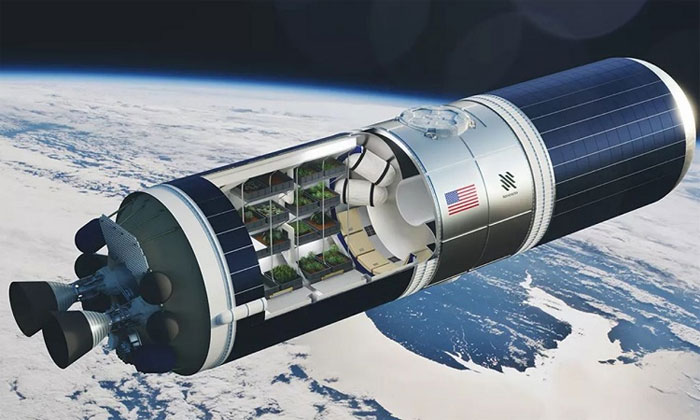Greenhouses grow mutant seeds in space
The company's high-tech greenhouse StarLab Oasis will grow mutant seeds in space in the desert and in Earth's orbit.

Design of a space greenhouse inside the Nanoracks StarLab module. (Photo: Nanoracks/Mack Crawford)
The company Nanoracks, which deployed small satellites from the International Space Station (ISS), has just established a subsidiary specializing in science and technology in the United Arab Emirates (UAE) called StarLab Oasis . The new company will open its first test greenhouse in 2022, according to general manager Allen Herbert. StarLab Oasis scientists will send seeds of important agricultural crops into space to create mutations that will help create new varieties with stronger vitality and higher yields. This space mutagenesis technique has been successfully applied in China for more than three decades.
Currently, China is the only country in the world that has deployed a space breeding program, bringing many benefits to its people. China has launched seeds into space in several flights since the late 1980s. In 2006, the Shijian-8 satellite orbited and returned to Earth with 215 kg of vegetables and seeds. Agricultural regulators in China have approved more than 200 mutant space crops with improved yields, greater environmental adaptability and disease resistance since the 1990s, including wheat. The second most planted in the country, Luyuan 502.
"One day, sustainable and economically viable food production will be largely concentrated in deserts, extreme environments and extraterrestrials. The reason is the abundance of renewable solar energy. Thanks to the technology developed by StarLab Oasis, we can certainly grow food more efficiently in the desert and in space thanks to the energy available , " shared Herbert.
The increasing impacts of climate change could turn more and more arable land on Earth into places vulnerable to unpredictable weather. At the same time, space agencies are looking for technology that allows food to be grown in extreme places beyond Earth like the Moon, Mars or celestial bodies with cold temperatures, atmosphere and very little water. StarLab Oasis hopes that greenhouses growing new, more resilient mutant plants will help transform agriculture in a region heavily dependent on food imports.
Previously, Nanoracks has launched seeds to the International Space Station, including palm tree seeds selected by the UAE Space Agency in 2019. These seeds are being researched at UAE University. Nanoracks is also developing technology to turn used rocket stages into mini space stations. The first station could start operating in 2024, and it is likely that some of them will act as greenhouses in the orbit of StarLab Oasis, according to Herbert.
- Introduce and guide how to grow sprouts
- Planting trees on Mars
- China aspires to create genetically modified seeds in outer space
- How to choose melon seeds is not stained with chemicals
- Stunned for 800 years pumpkin seeds can still sprout
- The fruits with seeds are eaten by no one to notice
- Banana seeds cure kidney stones
- Delicious mini carrot cultivation at home
- Plants from 2000 year old seeds still grow well
- Survivability of seeds in the universe
- Real plants grow up from the stomach of the dead
- 10 interesting misunderstandings of Vietnamese children in the past
 Norway built the world's tallest wooden tower
Norway built the world's tallest wooden tower Kremlin
Kremlin Ashurbanipal: The oldest royal library in the world
Ashurbanipal: The oldest royal library in the world Decoding the thousand-year construction of Qin Shihuang shocked the world
Decoding the thousand-year construction of Qin Shihuang shocked the world